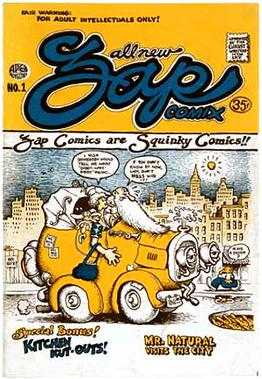
Underground comix are small press or self-published comic books that are often socially relevant or satirical in nature. They differ from mainstream comics in depicting content forbidden to mainstream publications by the Comics Code Authority, including explicit drug use, sexuality, and violence. They were most popular in the United States in the late 1960s and 1970s, and in the United Kingdom in the 1970s.

Harvey Kurtzman was an American cartoonist and editor. His best-known work includes writing and editing the parodic comic book Mad from 1952 until 1956, and writing the Little Annie Fanny strips in Playboy from 1962 until 1988. His work is noted for its satire and parody of popular culture, social critique, and attention to detail. Kurtzman's working method has been likened to that of an auteur, and he expected those who illustrated his stories to follow his layouts strictly.

Kitchen Sink Press was a comic book publishing company founded by Denis Kitchen in 1970. Kitchen Sink Press was a pioneering publisher of underground comics, and was also responsible for numerous republications of classic comic strips in hardcover and softcover volumes. One of their best-known products was the first full reprint of Will Eisner's The Spirit—first in magazine format, then in standard comic book format. The company closed in 1999.

Little Annie Fanny is a comics series by Harvey Kurtzman and Will Elder. It appeared in 107 two- to seven-page episodes in Playboy magazine from October 1962 to September 1988. Little Annie Fanny is a humorous satire of contemporary American society and its sexual mores. Annie Fanny, the title character, is a statuesque, buxom young blonde woman who innocently finds herself nude in every episode. The series is notable for its painted, luminous color artwork and for being the first full-scale, multi-page comics feature in a major American publication.
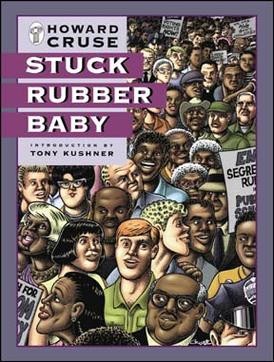
Stuck Rubber Babyis a 1995 graphic novel by American cartoonist Howard Cruse. He created his debut graphic novel after a decades-long career as an underground cartoonist. It deals with homosexuality and racism in the 1960s in the southern United States, in the midst of the Civil Rights Movement. While the book is not autobiographical, it draws upon Cruse's experience of growing up in the South during this time period, including his accidental fathering of a child, as referred to in the title.

Trina Robbins is an American cartoonist. She was an early participant in the underground comix movement, and one of the first female artists in that movement. She is a member of the Will Eisner Hall of Fame.
Jack Edward Jackson, better known by his pen name Jaxon, was an American cartoonist, illustrator, historian, and writer. He co-founded Rip Off Press, and some consider him to be the first underground comix artist, due to his most well-known comic strip God Nose.

Michael Terry Gilbert is an American comic book artist and writer who has worked for both mainstream and underground comic book companies.
A comic jam is a creative process where one or more comics artists collaborates on drawing or painting one single comic. Often the process is that one artist creates the first page, and then another artist creates the second, and a third does the next, and so on. There is no script that the artists work from, and the content of the comics is improvised. Any given artist working on a comic jam makes a page based solely on what happened on the previous page. Variations include each artist contributing a single panel, or set of two or three panels, and then passing it on to the next participant. The cartoonists of the seminal underground anthology Zap Comix were known for contributing a jam comic to each issue of Zap from around issue #3 onward.
Jim Mitchell is an American underground cartoonist from Milwaukee. Mitchell was part of the late-1960s/early-1970s Milwaukee underground comix scene and a co-founder of the Krupp Comics/Kitchen Sink group.

Randolph Holton Holmes was a Canadian artist and illustrator probably best known for his work in underground comix. His work was of a higher level of quality than was seen elsewhere in the field, and is considered comparable to such creations as Gilbert Shelton's The Fabulous Furry Freak Brothers and Robert Crumb's Mr. Natural.
James Vance was an American comic book writer, author and playwright, best known for his work from Kitchen Sink Press and in particular the lauded Kings in Disguise.
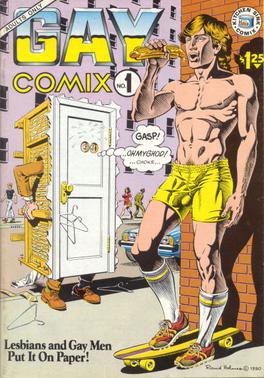
Gay Comix is an underground comics series published from 1980–1998 featuring cartoons by and for gay men and lesbians. The comic books had the tagline “Lesbians and Gay Men Put It On Paper!”
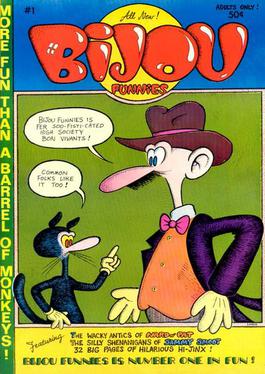
Bijou Funnies was an American underground comix magazine which published eight issues between 1968 and 1973. Edited by Chicago-based cartoonist Jay Lynch, Bijou Funnies featured strong work by the core group of Lynch, Skip Williamson, Robert Crumb, and Jay Kinney, as well as Art Spiegelman, Gilbert Shelton, Justin Green, and Kim Deitch. Bijou Funnies was heavily influenced by Mad magazine, and, along with Zap Comix, is considered one of the titles to launch the underground comix movement.
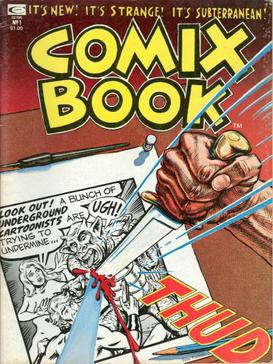
Comix Book is an underground comic book series published from 1974 to 1976, originally by Marvel Comics. It was the first comic of this type to be published by a mainstream publisher. Edited by Denis Kitchen, Comix Book featured work by such underground luminaries as Justin Green, Kim Deitch, Trina Robbins, Art Spiegelman, and S. Clay Wilson. While it did not depict the explicit content that was often featured in underground comix, it was more socially relevant than anything Marvel had previously published.

Harvey Kurtzman's Jungle Book is a graphic novel by American cartoonist Harvey Kurtzman, published in 1959. Kurtzman aimed it at an adult audience, in contrast to his earlier work for adolescents in periodicals such as Mad. The social satire in the book's four stories targets Peter Gunn-style private-detective shows, Westerns such as Gunsmoke, capitalist avarice in the publishing industry, Freudian pop psychology, and lynch-hungry yokels in the South. Kurtzman's character Goodman Beaver makes his first appearance in one of the stories.
Hey Look! is a series of one-page comic book fillers by American cartoonist Harvey Kurtzman, produced between 1946 and 1949 for Timely Comics.
Dan E. Burr is an American comic book artist best known for his collaborations with writer James Vance on Kings in Disguise and On the Ropes, both set during the Great Depression. He is known for the meticulous research that goes into his artwork.
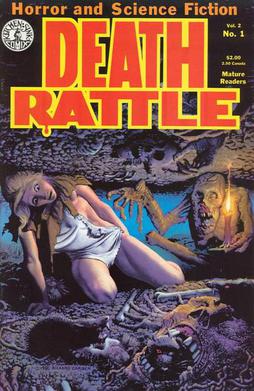
Death Rattle was an American black-and-white horror anthology comic book series published in three volumes by Kitchen Sink Press in the 1970s, 1980s, and 1990s. Death Rattle is not related to the Australian one-shot comic Death Rattle, published by Gredown in c. 1983.
Zavier Leslie Cabarga, popularly known as Leslie Cabarga, is an American author, illustrator, cartoonist, animator, font designer, and publication designer. A participant in the underground comix movement in the early 1970s, he has since gone on to write and/or edit over 40 books. His art style evokes images from the 1920s and 1930s, and over the years Cabarga has created many products associated with Betty Boop. His book The Fleischer Story in the Golden Age of Animation, originally published in 1976, has become the authoritative history of the Fleischer Studios.














